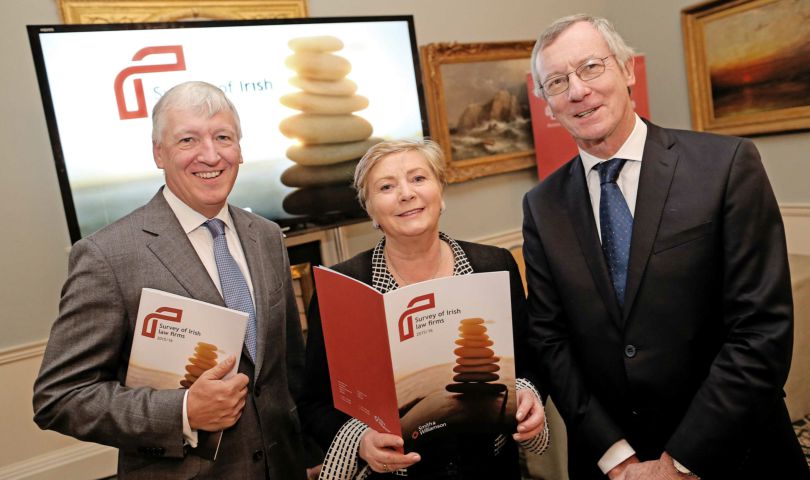Irish legal firms grew revenues and profits in 2015 but are facing continued recruitment difficulties and heightened IT security threats, according to the latest Smith & Williamson survey of the sector.
The survey found that almost 50% of legal firms increased their staff numbers in 2015. All of Ireland’s top 20 practices were among those recruiting.
While 93% of the top 20 and 57% of all legal firms generally expect to add to their workforce in 2016, one in two of the top 20 firms currently have more than five vacancies.
“There may well be issues for the future if the numbers entering the legal profession do not increase, as most firms have increased their intake of trainee solicitors, whilst the numbers entering the profession remained static at 388 last year,” said Paul Wyse, MD of Smith & Williamson Ireland.
“This number is well down on the average entering the profession in the 2005-to-2008 period. This has sparked fears within the sector that the growing skill shortage will limit the competiveness of firms as they struggle to fill positions.”
Firms are also witnessing an increase in competition, with over 50% experiencing a rise in the level of competitive pressures. Most believe this is because large firms are increasing their areas of practice and client base, which is particularly prevalent in Dublin, and increasing pressure from clients.
Nonetheless, the outlook for 2016 continues to remain positive, with almost three in every four firms anticipating an improved outlook for their firm and the sector.
The key driver behind the renewed confidence could be the fact that revenues increased in 70% of firms in the last year (93% of the top 20 firms). Profits also increased in 64% of firms in the last year (73% of the top 20 firms), according to the report.
Cyber Security
The last 12 months has seen cyber security rapidly become an area of major focus for legal firms, with one in five suffering cyber-attacks on their IT systems (one in three of top 20 firms).
As a result, some 83% of all firms reported investment in their IT systems over the past 12 months and almost two in three firms are planning further IT investment over the next 12 months.
This spend has been prompted by the increased role of IT in legal practices and clients being able to access their files online, as well as the risks posed in terms of security
Considering a large percentage of attacks go unreported due to their sensitive nature, cyber security has now become a critical key issue for the sector.
Third Party Funding
The issue of ‘third-party funding’ came directly before the courts in Ireland for the first time in July in the Persona/Sigma case and has raised concerns within the sector.
One in two firms (two in three of top 20 firms), however, are in favour of third-party funding of litigation cases, according the survey. Nonetheless, the majority are opposed to crowdfunding being used (57% overall and 80% of top 20 firms) to fund legal cases.
Scepticism also remains in the legal sector around the timing of the government’s proposed overhaul of the Legal Services Regulation Bill.
One in three firms surveyed said they thought the Bill will not be implemented in the next 12 months. However, most firms are happy with the New Court of Appeal and feel it is meeting their expectations.
Brexit
Brexit provides another area of concern for legal firms. Most surveyed (59% and 87% of the top 20 firms) believe the legal sector in Ireland would be impacted negatively by the UK leaving the EU.
The key practice areas law firms anticipate would be impacted most by Brexit are regulatory/banking/financial services and corporate/commercial services.
Commenting on the overall survey findings, Paul Wyse said: “Increasing staff costs and competition for talent are very evident in this year’s survey. Two in three of the top 20 firms paid salary increases in excess of 5% to their staff last year.
“However, the sector has a lot of work to do in attracting and retaining talented people, as few firms have formal processes for entry to partner level and many have no defined career paths or development plans for staff. The larger firms as expected are more focused on these issues.”
He added: “Pressure on fees from clients and increasing competition is driving legal firms to become more efficient.
“The key factors identified in both the Irish and UK Legal Firms Surveys carried out by Smith & Williamson this year were changes to fee structures and the use of technology in firms to improve service delivery and interaction with clients.”
 Paul Wyse (left), managing director of Smith & Williamson, justice minister Frances Fitzgerald and Mr Justice Sean Ryan, president of the Court of Appeal
Paul Wyse (left), managing director of Smith & Williamson, justice minister Frances Fitzgerald and Mr Justice Sean Ryan, president of the Court of Appeal







